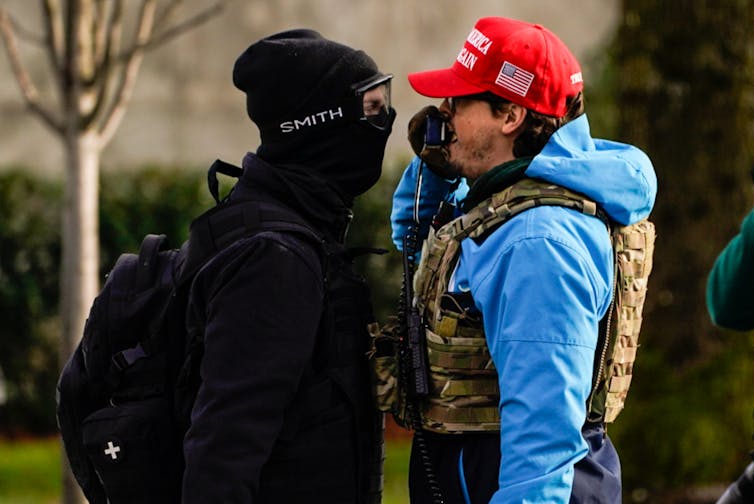Watch Asian Americans Decide on SBS On Demand
How to thaw enmity and disdain
-Arie W. Kruglanski, University of Maryland
The image of , though perhaps intuitive and appealing, is a myth that doesn’t hold up on closer scrutiny.
As a who has investigated radicalisation, polarisation and populism, I believe a “two tents” metaphor would be more accurate.
If you look at 2020 election data, you’ll find both the Trump and Biden camps contained diverse points of view, interests and concerns.
Within the Trump tent were Republican stalwarts bent on who supported President Donald Trump for cultural reasons and evangelical Christians passionately against abortion. Present were white “America First” adherents who were vociferously anti-immigration but ; Latinos who themselves are immigrants; and African Americans who saw .
Biden’s supporters were urban and suburban dwellers who differed in many ways but shared concern about the mishandling of COVID-19. His tent contained centrist Democrats and economic socialists, Black Americans intent on addressing systemic racism and members of the LGBTQ community defending their rights.
These tents overlap, and many Americans have walked from one tent to the other. Trump won . But millions of evangelicals he won in 2016 . There have been , and a significant coterie of high-profile GOP party members .
Across the political spectrum, American voters say they want the president to be a uniter rather than a divider. In October 2020, . They delivered the White House to Biden, a candidate who emphasised unity over resentments, while supporting Republicans in Congress.
Such election results signal that Americans are resistant to either party’s domination, which is effectively a call for collaboration. With society shocked by COVID-19 casualties and Trump’s unconventional presidency, the pieces of the American political puzzle may fit together in novel ways.
Toning down the rhetoric, resisting extremism, avoiding vindictiveness and stressing pragmatic solutions can build up a common ground that will mend the fraying fabric of our society.
Dan Raviv, an author and media analyst, contributed to this article.
America’s political divide will be very hard to heal
-Robert Talisse, Vanderbilt University  In his victory speech, Joe Biden said that partisanship “is not due to some mysterious force” but “a choice we make,” asking Americans to “give each other a chance.”
In his victory speech, Joe Biden said that partisanship “is not due to some mysterious force” but “a choice we make,” asking Americans to “give each other a chance.”

His advice for doing that: “listen.”
But lack of listening isn’t the problem here. My on polarisation shows toward opponents than with misunderstanding their views. When those feelings are intense, as they are right now, listening can actually deepen divisions. So when opponents speak, .
As a result, Americans today see their opponents as untrustworthy, dishonest, unpatriotic, threatening and even , according to recent polling by the Pew Research Center. Bitter partisanship has rendered Americans .
Research shows that typically intensifies animosity toward rivals. And . That’s why even fact-checking Trump’s tweets : When Twitter marks a Trump tweet as misleading, research finds, Republicans grow more inclined to believe it, while Democrats grow less inclined.
Listening can heal only when our divides lie within democracy’s mutual ground – the basic principle that, despite their differences, citizens are political equals. Today’s bitter partisanship this mutual ground in the United States.
In order to heal, Americans must recover the democratic mutual ground. Doing so would require rehabilitating people’s views of their fellow citizens. That is, Americans would need to see other Americans as people first, independently of their partisan affiliation.
. Partisan division is a feature of our everyday social environments, with Republicans and Democrats often living .
If we , the road to healing does not run through more political dialogue. Instead, Americans would need to do things together that have nothing to do with politics, engaging in activities that in no way express our partisan loyalties – volunteering with a community organisation, for example, or joining a .
Yet . And how do you heal a nation through bowling, anyway? You can’t, of course. Meanwhile, all the big stuff Americans do as a nation, from voting to raising families, is tinged with partisanship.
Until we can put politics in its right place – and I can’t fathom when that will be – partisan divides will persist.
The authors do not work for, consult, own shares in or receive funding from any company or organisation that would benefit from this article, and have disclosed no relevant affiliations beyond their academic appointment.

